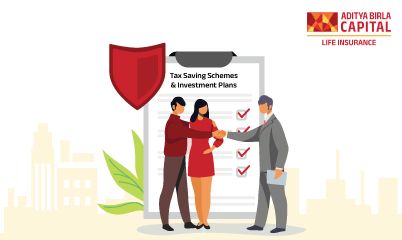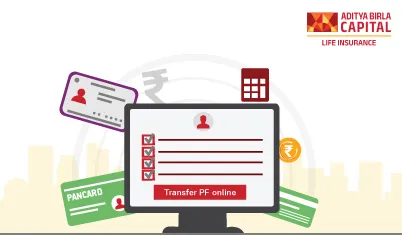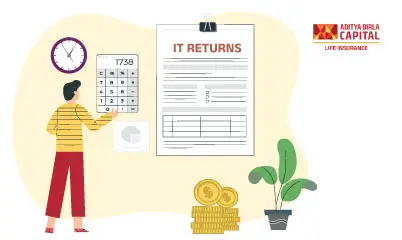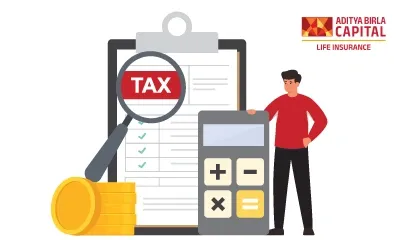Lowering your tax liability to claim a refund of excess TDS
A low tax liability can make you eligible for the refund of excess TDS deducted from your income. Moreover, in the case of TDS on salary, if you can claim deductions and exemptions from your salary income, the rate of TDS is also lowered.
So, here are some ways in which you can reduce your tax liability and, consequently, claim a refund of excess TDS –
Make full use of Section 80C
Section 80C8 of the Income Tax Act allows deductions up to Rs.1.5 lakhs on eligible investments and expenses which are as follows –
|
Eligible investments
|
Eligible expenses8
|
| National Savings Certificates | Tuition fee paid for children |
| Public Provident Fund | [Life insurance](https://lifeinsurance.adityabirlacapital.com/) premiums |
| Sukanya Samriddhi Yojana | Home loan principal repayment |
| Senior Citizen Saving Scheme | Stamp duty and registration charges paid for a house |
| Equity Linked Saving Scheme | |
| 5-year fixed deposits of banks and post offices | |
| Employee Provident Fund contributions | |
Ensure that you utilize the full deduction of Rs.1.5 lakhs under
Section 80C so that you can lower your taxable income and the consequent tax liability.
Invest in a health insurance plan
A health insurance plan also helps you lower your tax liability besides allowing financial relief in medical emergencies. The premium that you pay for the policy is allowed as a deduction under Section 80D9 of the Act. The limit of deduction is given in the following table –
|
Details of premium payment
|
Available limit
|
| Premium paid for self and/or family (spouse and/or children) when you are not a senior citizen | Up to Rs.25,000 |
| Premium paid for self and/or family (spouse and/or children) when you are a senior citizen | Up to Rs.50,000 |
| Premium paid for parents when parents are not senior citizens | Additional deduction up to Rs.25,000 |
| Premium paid for parents when parents are senior citizens | Additional deduction up to Rs.50,000 |
Paying premium for your parents can earn you an additional deduction on the total premium paid. So, insure your parents under the health plan for higher deductions. Higher deductions mean lower taxable income and lower taxable income means lower tax liability.
Use NPS for retirement planning
The National Pension System allows you to create a market-linked retirement corpus that guarantees pension payments after maturity. What sets the NPS scheme apart is the additional tax benefit* that it offers.
The contribution to the NPS scheme qualifies for a deduction under Section 80CCD (1)10. The limit of deduction is Rs.1.5 lakhs but it is included in the overall deduction limit of Section 80CCE11.
However, section 80CCD (1B)10 allows for an additional deduction up to Rs.50,000 for NPS investments. This deduction limit is above the limit of Section 80CCE thus allowing you additional tax deduction on NPS investments.
Moreover, if your employer contributes to the NPS scheme on your behalf, you can claim an additional deduction up to 10% of your basic pay and dearness allowance. This deduction is allowed under Section 80CCD(2)10 and the deduction is available even in the new tax regime.
Donate to the causes that you believe in
Making charitable donations not only gives you internal happiness and satisfaction, but it can also help you lower your tax liability. The income tax act allows all donations to recognized charitable causes as deductions from your taxable income. The deduction is allowed under Section 80G12 and you can file a claim of 100% or 50% deduction of the amount donated.
Here’s a look at some of the recognized donations that qualify for a deduction –
|
Donations that enjoy a 100% deduction of the amount without any upper limit
|
Donations that allow a 50% deduction
|
- Prime Minister’s National Relief Fund
- National Defence Fund of the Central Government
- National Cultural Fund
- National Sports Fund
- National Children’s Fund
- Assistance Fund for National Illness
- National Fund for Control of Drug Abuse
- Technological Development and Application Fund
|
- Drought Relief Fund of the Prime Minister
- Foundation of Rajiv Gandhi
- Trust of Indira Gandhi Memorial
- Fund for Jawaharlal Nehru Memorial
|
There are other donations that have an upper limit of 10%
12 of the adjusted amount of the gross total income.
Check the list of eligible donations and then donate to the causes that you believe in enjoying tax benefit in the process.
**Maximize deduction on the home loan interest**
If you have a home loan, you can choose to claim deduction on the interest paid on the same. The deductions13 are available as follows –
- Interest paid on the home loan is allowed as a deduction under Section 24. The deduction limit is Rs.2 lakhs and you can thus claim a deduction for an under-construction property (provided the construction is completed within 5 years) as well as for a ready-to-move-in flat.
- If you are a first-time home buyer and you avail of a home loan within 31st March 2022, you can also claim an additional deduction for the interest paid. The additional deduction is allowed under Section 80EEA up to Rs.1.5 lakhs provided the stamp duty value of the house is up to Rs.45 lakhs.
So, overall, you can file a claim a deduction up to Rs.3.5 lakhs through a home loan.
Submit Form 15G/H to avoid TDS
This is for those taxpayers whose taxable income is within Rs.2.5 lakhs. Since your income is within the threshold limit of Rs.2.5 lakhs7, the TDS deducted from your bank deposit can be avoided altogether. To avoid this TDS and eliminate the hassle of filing the income tax return to claim TDS refund, you can simply submit Form 15G or Form 15H (for senior citizens) to the financial institution. Basis this form, no TDS would be deducted from the deposit interest allowing you to save your income from TDS deductions.
The Income Tax Act allows a list of avenues to lower your tax liability. Explore these avenues and lower your tax liability. With a reduced tax liability, you can choose to claim a refund of the excess TDS deducted from your income and save taxes. Your disposable income would increase allowing you to step up your savings too and meet your financial goals easily.












